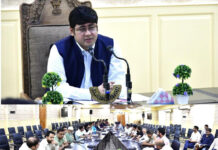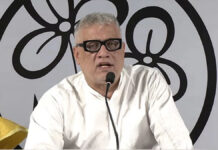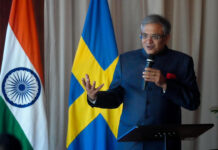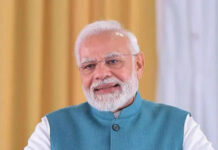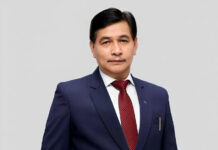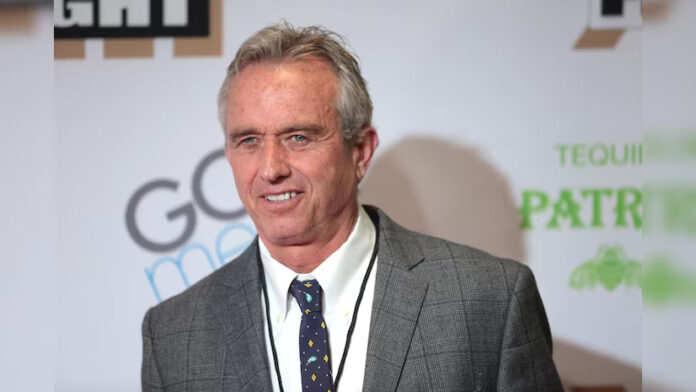Washington, Mar 18
The lack of excitement many Americans feel about a presidential rematch has heightened interest in alternatives to the major-party candidates, none more so than Robert F Kennedy Jr., whose famous name has helped him build buzz for his independent bid.
Kennedy is a huge longshot to win Electoral College votes, much less the presidency. But his campaign events have drawn large crowds of supporters and people interested in his message. He plans to announce his vice presidential nominee later this month in Oakland, California, and is stoking expectations that he might pick New York Jets quarterback Aaron Rodgers or former Minnesota Gov. Jesse Ventura.
Here is a look at his campaign and what he’s stood for:
Who is Robert F Kennedy Jr?
Kennedy, 70, is a member of perhaps the nation’s most famous political dynasty. His uncle was President John F Kennedy. His father served as attorney general and a US senator before seeking the Democratic nomination for president. Both were assassinated.
RFK Jr built a reputation of his own as an activist, author and lawyer who fought for environmental causes such as clean water. More recently, his activism has veered into conspiracies and contradicted scientific consensus, most infamously on vaccines. Some members of his family have publicly criticised his views.
Kennedy founded Waterkeeper Alliance, which works to secure clean water, and Children’s Health Defense, an anti-vaccine group that saw its reach grow rapidly during the pandemic. Children’s Health Defense has a lawsuit pending against a number of news organisations, among them The Associated Press, accusing them of violating antitrust laws by taking action to identify misinformation, including about Covid-19 and Coivid-19 vaccines. Kennedy took leave from the group when he announced his run for president but is listed as one of its attorneys in the lawsuit.
He’s married to actress Cheryl Hines.
What does Kennedy’s campaign look like?
Kennedy’s need to collect thousands of signatures to get on the ballot has taken him to places that rarely see presidential candidates, including Hawaii, Wyoming and West Virginia.At events in Phoenix and Las Vegas, hundreds of supporters queued up outside hours before he was scheduled to arrive. He attracts a legion of fans, many of whom have listened extensively to Kennedy’s interviews on podcasts or YouTube videos. In Nevada, massive graphics and photos were projected on three walls as upbeat music played. Drinks and merchandise were for sale. Kennedy speaks in a quiet, strained voice, sometimes haltingly, the result of a neurological condition called spasmodic dysphonia.
What does he talk about?
Kennedy frames himself as a truthteller with a track record of fighting for the middle class against powerful interests. He points to lawsuits he’s won against corporate behemoths such as Monsanto and DuPont.
“I can fix this country,” he said in Las Vegas in February. “All these agencies that intimidate normal politicians, I’ve sued every one of them. … When you sue these agencies, you get a Ph.D. in corporate capture and how to unravel it.” Corporate capture refers to private interests using their influence to control government decision-making, as when they help draft legislation. Kennedy has been critical of US support for Ukraine and supportive of Israel’s war against Hamas. He wants to reduce military and health care spending because of the impact on budget deficits, and combat rising housing costs so young people can afford to buy homes. Kennedy has found a loyal following among people distrustful of institutions and those who believe the government has been captured by corporations, especially pharmaceutical companies.
He hasn’t shied away from his controversial views on health care and vaccines. He wants to dismantle the public health bureaucracy, saying he’d immediately tell the National Institutes of Health to refocus research away from infectious diseases and vaccines and toward chronic diseases.
Kennedy insists he is not anti-vaccine and claims he has never told the public to avoid vaccination. But he has repeatedly made his opposition to vaccines clear. He said on a podcast “there’s no vaccine that is safe and effective” and has urged people to resist CDC guidelines on when kids should get vaccinated.
While there are rare instances when people have severe reactions to vaccines, the billions of doses administered globally provide real-world evidence that they are safe. The World Health Organisation says vaccines prevent as many as 5 million deaths each year.
Can he win?
The United States has a long history of rejecting independent or third-party presidential candidates. In fact, the last president to win without a party’s backing was George Washington, and he did it before there were political parties.
The last third-party candidate to make it to the White House was Abraham Lincoln with the newly formed Republican Party. The last third-party candidate to pull more than single digits in the popular vote was Ross Perot, a businessman who won 19% in 1992 and 8% in 1996. But he won zero electoral votes.
ADVERTISEMENT
And while the independent share of the electorate is growing, it is still dwarfed by voters who consistently support Republican or Democratic candidates, even if they identify as independent. In other words, the odds are long.
Kennedy’s case for optimism hinges on his relatively strong showing in a few national polls. Polls during the 2016 presidential campaign regularly put libertarian Gary Johnson’s support in the high single or low double digits, but he ultimately received only about 3% of the vote nationwide.
Horse-race polls are also notoriously unreliable this far out from an election, and many Americans don’t know who Kennedy is. A February AP-NORC poll found, for instance, that 29% of Americans don’t know enough about Kennedy to have a view about him.

